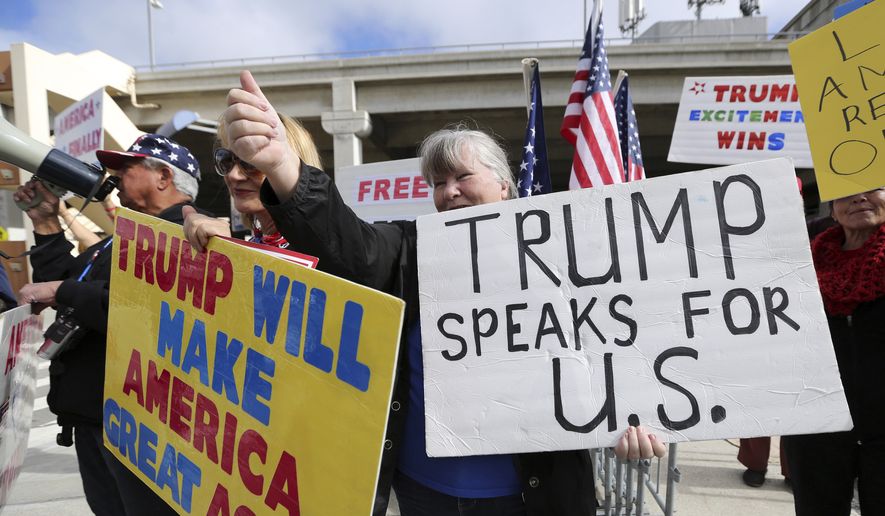OPINION:
President Trump probably shouldn’t have called the federal judge who blocked his immigration order a “so-called” judge on Twitter over the weekend.
But it’s just a tweet, not a constitutional crisis.
And let’s not pretend other presidents never dared to criticize the judicial branch on rulings they didn’t like.
Former President Barack Obama called out the Supreme Court in his State of the Union address in 2010, blasting its Citizen’s United decision.
“Last week, the Supreme Court reversed a century of law to open the floodgates for special interests — including foreign corporations — to spend without limit in our elections,” Mr. Obama said, looking directly at the Supreme Court. “Well I don’t think American elections should be bankrolled by America’s most powerful interests, or worse, by foreign entities. They should be decided by the American people, and that’s why I’m urging Democrats and Republicans to pass a bill that helps to right this wrong.”
During his speech, Justice Samuel Alito mouthed the words “not true,” and it was Mr. Alito’s reaction that garnered the most press attention the next day, rather than Mr. Obama’s fiery words challenging the court.
Then there was the political maneuvering — led by the White House in 2011 — directed at persuading Chief Justice John Roberts that if he didn’t uphold Obamacare, the courts would become politicized.
According to a CBS report at the time: “There were countless news articles in May warning of damage to the court — and to Roberts’ reputation — if the court were to strike down the mandate. Leading politicians, including the president himself, had expressed confidence the mandate would be upheld. Some even suggested that if Roberts struck down the mandate, it would prove he had been deceitful during his confirmation hearings, when he explained a philosophy of judicial restraint.”
Mr. Obama said, prior to the ruling, if an “unelected group of people” took “what would be an unprecedented, extraordinary step of overturning a law that was passed by a strong majority of a democratically elected Congress,” it would be judicial activism at its worse.
Mr. Roberts did indeed cave to the pressure, and Obamacare was upheld. Neera Tanden, the president of the Center for American Progress, praised Mr. Obama’s activism in an email released by WikiLeaks, and suggested Hillary Clinton’s team take a similar approach on the campaign trail.
Ms. Tanden, in an email to Mrs. Clinton’s communication director Jennifer Palmieri and campaign chairman John Podesta wrote on June 2, 2015, as the Supreme Court was considering its second Obamacare ruling: “It is most likely that this decision has already been made by the Court, but on the off chance that history is repeating itself, then it’s possible they are still deciding (last time, seems like [Chief Justice John] Roberts went from striking the mandate to supporting it in the weeks before).”
“As Jennifer will remember, it was pretty critical that the President threw the gauntlet down last time on the Court, warning them in the first case that it would politicize the role of the Court for them to rule against the ACA. As a close reader of the case, I honestly believe that was vital to scaring Roberts off,” she admitted.
Mr. Obama’s predecessors also were critical of the courts — just not in such a forward manner.
Then-President George W. Bush criticized a 2008 Supreme Court ruling recognizing the rights of Guantanamo Bay, Cuba, prisoners, at a news conference in Rome. And in a statement read by his lawyer, then-President Richard Nixon said he was upset with a 1974 ruling ordering him to turn over the tapes that would lead to the demise of his presidency.
And our Republic survived all of it. So, too, will we under President Trump.




Please read our comment policy before commenting.